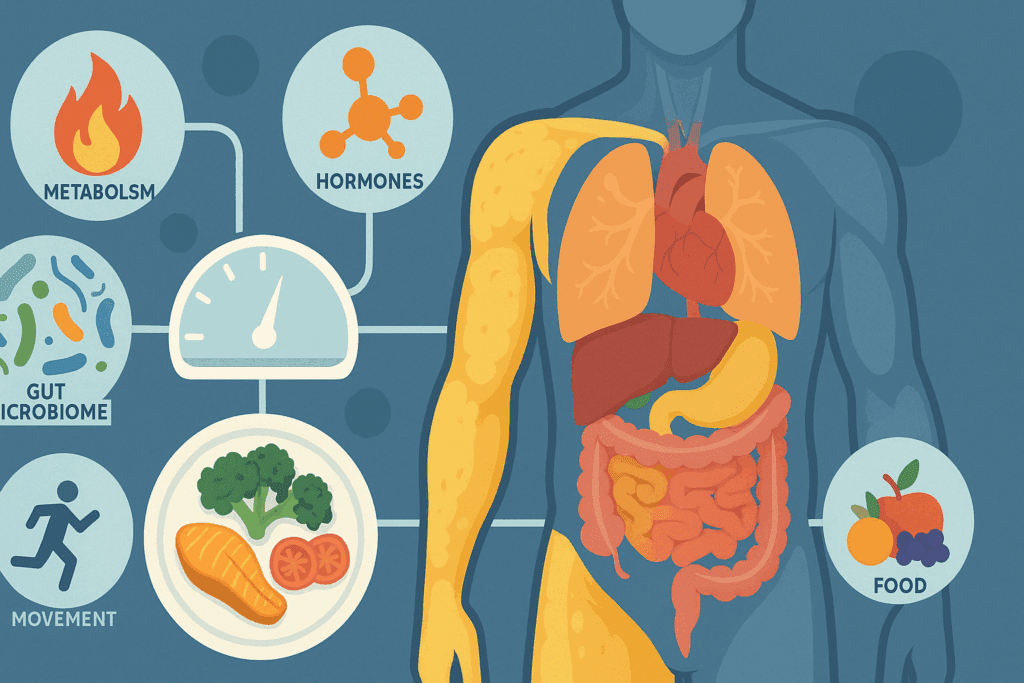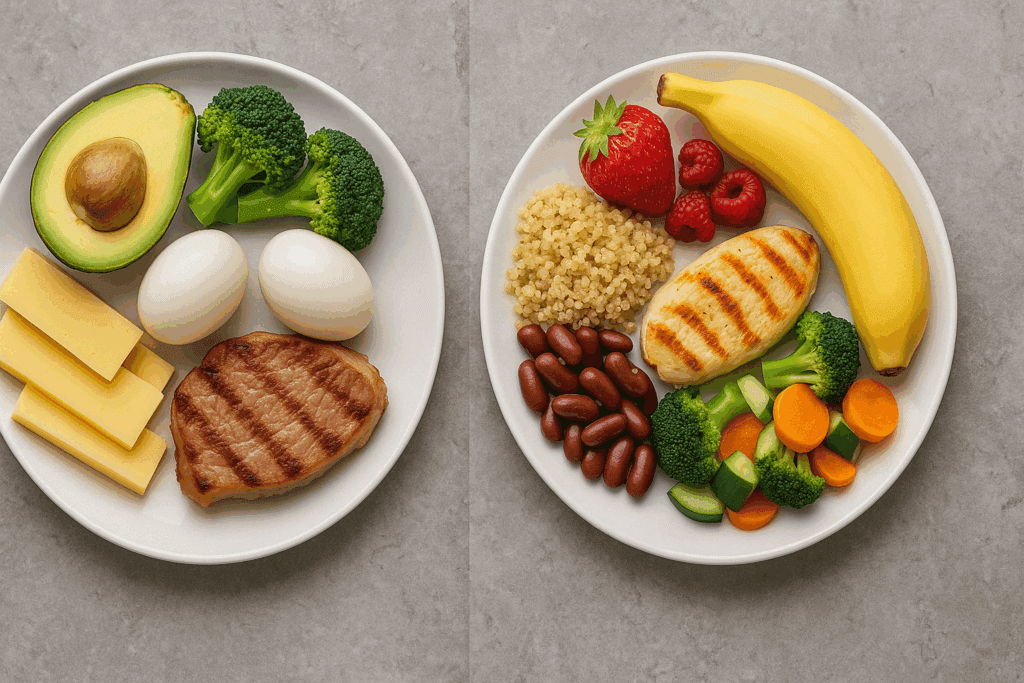For anyone overwhelmed by the sheer number of weight loss solutions promoted online, in advertisements, and even by healthcare professionals, the question isn’t just “what works,” but “what works for me—and why?” With so many diet programs for losing weight competing for attention, it’s easy to become discouraged or confused. The reality is that the best weight loss program isn’t necessarily the trendiest one—it’s the one grounded in evidence, personalized to individual needs, and designed to support long-term well-being, not just quick results. This article explores top weight loss programs that actually work, explaining the science behind them while offering expert insights into how to choose a diet health program that aligns with your body, lifestyle, and goals.
You may also like: Smart Meal Prep for Weight Loss: Expert-Approved Lunch Ideas and Recipes to Stay on Track
Understanding the Science Behind Sustainable Weight Loss
Effective weight loss doesn’t rely on gimmicks or deprivation but on a sound understanding of how our bodies regulate energy, hormones, and metabolism. The goal of any top weight loss program should be to reduce body fat while preserving lean muscle mass, supporting metabolic health, and enhancing quality of life. Central to this is achieving a calorie deficit through balanced dietary intake and physical activity. However, calorie counting alone is not enough—nutrient quality, meal timing, gut microbiome health, and behavioral support all play critical roles.
Many popular diet programs for losing weight promise fast results through restrictive methods, but science tells us that weight regain is more likely when nutritional deficiencies, psychological stress, or metabolic adaptation are ignored. Sustainable programs take a comprehensive approach, incorporating whole foods, behavior change strategies, and ongoing support to help individuals achieve and maintain a healthy weight over time.

What to Look for in a Diet Health Program
When evaluating any diet health program, whether it’s a commercial plan or a medically supervised protocol, look for transparency, credibility, and personalization. Effective programs are backed by scientific research and often include registered dietitians, physicians, or certified health coaches on staff. They promote realistic weight loss goals—generally 1 to 2 pounds per week—and offer tools to track progress without fostering obsession or guilt.
Personalization is critical. Factors like age, gender, medical history, activity level, and even gut microbiome composition can influence how a person responds to specific foods or macronutrient ratios. Weight loss programs for women, for example, should consider hormonal fluctuations, pregnancy history, and bone health when designing meal plans and fitness routines. Programs that include behavior change components—such as mindful eating, cognitive-behavioral therapy, and emotional support—also tend to be more effective in the long term.
Types of Diets to Lose Weight: Comparing Popular Approaches
From low-carb and Mediterranean to intermittent fasting and plant-based, the types of diets to lose weight are as varied as the individuals who follow them. One of the most frequently debated comparisons in recent years is the ketogenic diet vs low carb plans. While both restrict carbohydrate intake, the difference lies in the degree of restriction. A ketogenic diet typically allows no more than 5% to 10% of calories from carbohydrates, aiming to shift the body into a state of ketosis, where fat becomes the primary energy source. By contrast, low carb diet keto diet alternatives may allow up to 30% of calories from carbohydrates and prioritize flexibility over strict ketosis.
Is keto a low carb diet? Technically, yes, but not all low carb diets are ketogenic. This distinction is important when choosing a plan that can be sustained over time. Many people find that extremely low-carb plans are difficult to maintain, particularly if they restrict fruits, legumes, or whole grains—foods that are rich in fiber and micronutrients. It’s also worth asking: is keto a good diet for long-term health? While some short-term studies show benefits for weight loss and blood sugar control, questions remain about cardiovascular health, gut microbiome diversity, and nutrient adequacy when the diet excludes entire food groups.
Is a keto diet sustainable? The answer depends on the individual. For those with strong motivation, medical supervision, and a preference for fatty foods, it may be manageable. But for others, it can feel socially isolating or nutritionally unbalanced. That’s why a personalized approach—guided by a health professional—is critical when considering whether a keto or low carb diet keto diet alternative is appropriate.

Evaluating the Best Weight Loss Programs for Women
Weight loss programs for women must account for physiological differences that influence fat distribution, metabolic rate, and hormonal cycles. Women typically have higher fat percentages than men, and their bodies may respond differently to calorie deficits, exercise regimens, or macronutrient compositions. For example, programs that severely restrict carbohydrates may disrupt menstrual cycles or thyroid function in some women.
A well-designed weight losing program for women will include a balanced blend of whole foods, resistance and cardiovascular training, stress management tools, and ample rest. It will also acknowledge the complex interplay between self-image, emotional eating, and social roles that many women face. Weight loss is not just about physical change—it involves reshaping habits, beliefs, and coping mechanisms.
Some of the best weight loss provides personalized coaching, community support, and a structure that empowers women rather than shaming them. This is especially important in a culture that often links female worth to appearance. Sustainable success lies in building confidence, not merely shrinking the number on a scale.
Why “Give Me a Weight Loss Program” Isn’t a One-Size-Fits-All Request
When someone says, “give me a weight loss program,” the impulse is understandable. They want a clear, actionable plan. But truly effective programs begin with questions, not prescriptions. What is the person’s current health status? What barriers have they encountered in the past? What motivates them, and what kind of support do they need?
Many people gravitate toward the top weight loss program lists found online or in magazines, but these rarely account for individual variability. A successful weight loss programme must evolve over time and be adaptable to life changes—such as shifts in work schedules, family obligations, or medical conditions. Moreover, programs should not rely solely on willpower but instead create systems that reduce friction and support consistent habits. This may include prepping meals ahead of time, using wearable tech for accountability, or leveraging social support.

Diet Programs for Losing Weight Without Nutritional Sacrifice
One of the biggest misconceptions about diet programs weight loss seekers encounter is the idea that success requires suffering. In reality, hunger, deprivation, and obsession are red flags. The best diet health program doesn’t just help people lose weight—it teaches them how to nourish their bodies, recognize fullness cues, and find satisfaction in food again.
Programs rooted in whole-food, plant-based nutrition tend to perform well in clinical studies. These diets emphasize fiber-rich vegetables, fruits, legumes, nuts, seeds, and whole grains, which not only support weight loss but also improve heart health, insulin sensitivity, and inflammation. They offer a stark contrast to the standard American diet, which is high in processed foods, sugar, and saturated fats.
Importantly, these programs can be adapted to fit different dietary preferences and restrictions. Whether someone is vegan, vegetarian, gluten-free, or simply looking to eat cleaner, a well-crafted whole-food-based plan can meet their needs without cutting out entire macronutrient groups or resorting to gimmicky supplements.
Low Carb vs. Keto: Navigating the Distinctions with Clarity
The public’s fascination with low-carb diets has only intensified with the rise of keto. But it’s essential to clarify the distinctions for those seeking informed choices. While both reduce carb intake, the goals and metabolic outcomes are different. Low-carb diets generally aim to moderate blood sugar and insulin response, while keto’s primary objective is to induce nutritional ketosis.
Is keto no carbs? Not exactly. Even the strictest ketogenic diets allow for trace carbs from non-starchy vegetables and certain dairy products. However, they eliminate most grains, fruits, and legumes, which can make long-term adherence difficult and raise concerns about nutrient diversity.
Understanding the nuances of ketogenic diet vs low carb can help individuals determine which plan fits their lifestyle and health goals. For someone with type 2 diabetes or epilepsy, a therapeutic keto diet under supervision may offer specific benefits. For others, a less restrictive low-carb approach may be more sustainable and enjoyable—leading to better compliance and long-term success.

Behavioral Science: The Missing Link in Most Weight Losing Programs
While meal plans and workout schedules are important, the most underutilized factor in most weight loss programs is behavior change science. Lasting transformation requires more than knowing what to eat—it requires rewiring habits, building emotional resilience, and reshaping identities. Effective programs integrate tools from cognitive-behavioral therapy (CBT), acceptance and commitment therapy (ACT), and motivational interviewing to help users stay consistent, even when motivation dips.
Habits like stress eating, mindless snacking, or weekend overindulgence don’t disappear through discipline alone. They require practical strategies—like keeping a food journal, practicing mindful eating, or building awareness around emotional triggers. The top weight loss program is the one that equips users with these tools and supports them over time with coaching, check-ins, or peer groups.
When Diet Alone Isn’t Enough: Metabolic and Medical Considerations
Sometimes, despite best efforts, weight loss plateaus or never begins. This is where medical evaluation becomes essential. Hormonal imbalances (such as hypothyroidism or polycystic ovarian syndrome), chronic inflammation, medication side effects, or metabolic adaptation can all hinder progress. A well-rounded diet health program will refer participants to medical professionals when necessary and work collaboratively with healthcare teams.
Additionally, for individuals with significant weight to lose or obesity-related complications, medically supervised programs or interventions such as pharmacotherapy or bariatric surgery may be appropriate. These are not shortcuts but tools to be used responsibly, in conjunction with lifestyle changes.
How to Know if a Weight Loss Program is Truly Working
Scale weight is only one metric, and not always the most telling. A high-quality weight loss programme will track progress using a variety of indicators: body composition (fat vs. lean mass), waist circumference, blood markers (like cholesterol and insulin), fitness levels, mood, and sleep quality. Equally important are subjective markers—energy levels, digestion, self-esteem, and confidence in maintaining healthy habits.
The best weight loss provides long-term improvements, not just temporary wins. Programs that deliver dramatic short-term results but leave individuals metabolically worse off are ultimately counterproductive. Instead, look for signs of lasting change: are habits becoming second nature? Are food choices more intuitive? Are social and emotional relationships with food improving? These are the outcomes that matter most.

Frequently Asked Questions: Top Weight Loss Programs That Actually Work
1. How do I know if a diet health program is right for my metabolism?
Understanding your metabolism is crucial before committing to any diet health program. Beyondstandard basal metabolic rate calculations, consider factors like your thyroid function, insulin sensitivity, and resting energy expenditure, which may vary significantly from average estimations. Genetic testing and metabolic panels offered by some weight loss programs for women and men can reveal how your body processes carbs, fats, and proteins, making your choice of diet more tailored and effective. Personalized feedback helps you identify which types of diets to lose weight will work in harmony with your biology. A program that adjusts based on metabolic feedback—rather than adhering rigidly to a one-size-fits-all model—demonstrates a high level of clinical credibility.
2. What role does sleep play in choosing a weight loss program?
Sleep isn’t just about rest; it influences hormones like ghrelin and leptin that regulate hunger andsatiety. If you’re starting a diet programs weight loss journey while chronically sleep-deprived, you may find cravings for processed carbs intensifying and your willpower weakening. A quality weight loss programme should educate users about circadian rhythms and the effect of sleep on metabolic function. Some top weight loss program platforms now include sleep tracking and recovery assessments to personalize advice based on rest quality. Incorporating sleep hygiene strategies can elevate your progress far beyond what calorie cutting alone can offer.
3. Why do some people regain weight after a successful weight losing program?
Weight regain is often due to a lack of focus on psychological resilience and sustainable habits. Manydiet programs for losing weight achieve initial success but fail to equip users with tools to manage long-term behavioral triggers, such as stress or social pressure. Effective weight loss programs for women and men alike address emotional eating, reward cycles, and post-goal identity shifts. Programs that phase into long-term maintenance plans and include relapse prevention strategies reduce the likelihood of rebound weight gain. This transition is just as critical as the initial program and is a hallmark of the best weight loss provides.
4. How does community support impact the effectiveness of diet programs weight loss seekers follow?
Community and accountability dramatically enhance adherence to a weight loss program. People aremore likely to follow through when they have regular check-ins, either digitally or in person. Peer motivation, group challenges, and shared recipes can reduce the feeling of isolation that often accompanies major lifestyle changes. Some diet health program platforms now integrate AI-driven social forums or mentor-matching features to personalize encouragement. In the most successful diet programs for losing weight, community acts as both motivation and a built-in support network during setbacks.
5. What overlooked factors should I consider when choosing among the top weight loss program options?
While nutrition and exercise plans get most of the spotlight, lesser-known variables like gutmicrobiome diversity, meal timing, hydration strategies, and even oral health can influence outcomes. Some emerging weight loss programme designs now factor in digestive enzymes, food intolerance testing, and even circadian alignment to boost efficacy. If you simply say “give me a weight loss program” without clarifying your full health picture, you may miss critical optimization points. Programs that evolve with emerging science and include wellness biomarkers in their assessments offer more than just weight loss—they promote overall vitality.
6. Are all weight loss programs for women designed to account for hormonal fluctuations?
Not all programs are equal when it comes to addressing female-specific needs, but the best weightloss provides hormonal awareness by default. Effective programs for women take into account factors such as the menstrual cycle, perimenopause, or polycystic ovarian syndrome (PCOS), which can significantly affect energy levels and fat storage. Personalized nutrient timing, adaptive workout protocols, and even phase-based macronutrient distribution can help accommodate these biological shifts. A truly responsive weight losing program offers flexibility and education on how hormones impact progress. Women seeking long-term results should prioritize programs that acknowledge these fluctuations as part of the journey.
7. Can intuitive eating and structured weight loss programs coexist?
Yes, and in fact, some of the most effective diet programs for losing weight are now merging intuitiveeating principles with data-backed nutrition strategies. While it may seem counterintuitive to combine meal tracking with hunger-based cues, a hybrid model allows users to recalibrate their internal awareness while staying on track with goals. This approach works particularly well for those recovering from restrictive eating patterns who still want structured guidance. A flexible diet health program that includes mindfulness training and emotional eating interventions offers sustainable weight loss without guilt. As the field evolves, programs that blend structure with self-trust will likely dominate the top weight loss program space.
8. What are some innovations shaping the future of diet programs weight loss solutions?
Technology is transforming the landscape of weight management. Real-time glucose monitoring,DNA-based meal suggestions, AI-driven coaching, and digital twins for predictive modeling are already being integrated into advanced diet programs weight loss consumers can access from home. These innovations allow for hyper-personalized recommendations, enabling quicker course correction and fewer plateaus. Programs that invest in continuous biometric data can predict plateaus before they occur and adapt dietary plans accordingly. The future of the best weight loss provides will likely include wearables that integrate sleep, stress, blood markers, and movement into a unified wellness dashboard.
9. How do psychological and social identities affect success in a weight loss programme?
Behavioral science tells us that people don’t just change actions—they change self-perception. If youridentity remains tied to a lifestyle incompatible with your goals, the best-designed weight loss program may still fall short. Successful programs explore the deeper “why” behind your habits and build new narratives around empowerment, health, and longevity. Group coaching, journaling prompts, and values-based goal setting are powerful tools in reshaping identity. Programs that only focus on meal plans miss the opportunity to foster deeper personal growth that supports sustained transformation.
10. What are the red flags to avoid when selecting a weight losing program?
Beware of programs that promise rapid results without evidence-based backing or offer dramaticcalorie restriction with no psychological support. A diet health program that lacks credentials, avoids accountability, or requires you to buy proprietary supplements may be more concerned with profit than your progress. Similarly, if you ask a provider to “give me a weight loss program” and they fail to ask about your medical history, lifestyle, or preferences, it’s time to walk away. The top weight loss program always begins with personalized assessment and includes flexibility, ongoing support, and clear scientific rationale. Trustworthiness, transparency, and sustainability are non-negotiable signs of quality.

Conclusion: Choosing the Right Diet Programs for Weight Loss with Clarity and Confidence
In the crowded marketplace of weight losing program options, clarity comes from aligning evidence with personal experience. The most effective diet programs weight loss seekers should consider are those that emphasize whole, nutrient-dense foods, foster behavior change, and honor the individuality of each person’s body, life, and goals. Whether exploring low carb diet keto diet hybrids, wondering if is keto a good diet for the long haul, or comparing ketogenic diet vs low carb alternatives, the key is to prioritize sustainability, not speed.
Is a keto diet sustainable? For some, yes—but for many, a flexible, whole-food approach that doesn’t require rigid restrictions will be more realistic and enjoyable. Asking questions like “is keto no carbs?” or “is keto a low carb diet?” reflects a desire to understand, not just follow. And that curiosity is the foundation of a successful journey.
Ultimately, the top weight loss program isn’t about perfection. It’s about consistent, science-informed decisions that create lasting change. When combined with mindful eating, physical activity, and emotional support, the right diet health program becomes more than a plan—it becomes a path to lifelong wellness.
Was this article helpful? Don’t let it stop with you. Share it right now with someone who needs to see it—whether it’s a friend, a colleague, or your whole network. And if staying ahead on this topic matters to you, subscribe to this publication for the most up-to-date information. You’ll get the latest insights delivered straight to you—no searching, no missing out.
Further Reading:
The 9 Best Diet Plans for Your Overall Health
What are the best weight loss programs available now?
How can I find a weight loss program that works for me?
Disclaimer
The information contained in this article is provided for general informational purposes only and is not intended to serve as medical, legal, or professional advice. While NewsHealthWatch strives to present accurate, up-to-date, and reliable content, no warranty or guarantee, expressed or implied, is made regarding the completeness, accuracy, or adequacy of the information provided. Readers are strongly advised to seek the guidance of a qualified healthcare provider or other relevant professionals before acting on any information contained in this article. NewsHealthWatch, its authors, editors, and contributors expressly disclaim any liability for any damages, losses, or consequences arising directly or indirectly from the use, interpretation, or reliance on any information presented herein. The views and opinions expressed in this article are those of the author(s) and do not necessarily reflect the official policies or positions of NewsHealthWatch.

